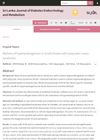 9 citations,
January 2007 in “Gynecological Endocrinology”
9 citations,
January 2007 in “Gynecological Endocrinology” A woman was the first known case to have both polycystic ovary syndrome and autoimmune polyglandular syndrome type 2, suggesting a need to check for both conditions in similar patients.
 8 citations,
May 2021 in “Reproductive Biology and Endocrinology”
8 citations,
May 2021 in “Reproductive Biology and Endocrinology” Different levels of anti-Müllerian hormone can help diagnose polycystic ovary syndrome in women of different ages.
 8 citations,
September 2017 in “The Journal for Nurse Practitioners”
8 citations,
September 2017 in “The Journal for Nurse Practitioners” Most women with PCOS use positive coping strategies, but some with more psychological stress use negative ones.
 8 citations,
April 2017 in “Medical Hypotheses”
8 citations,
April 2017 in “Medical Hypotheses” Men with early balding may have hormonal imbalances similar to women with PCOS and could benefit from similar treatments.
 8 citations,
March 2010 in “Gynecological Endocrinology”
8 citations,
March 2010 in “Gynecological Endocrinology” Free Testosterone Index, bioavailable testosterone, and androstenedione are the most accurate for diagnosing excess male hormones in PCOS.
8 citations,
September 2005 in “Practical diabetes” PCOS is a condition causing irregular periods, excess male hormones, and infertility, often managed by targeting insulin resistance and specific symptoms.
8 citations,
May 2005 in “Fertility and Sterility” A specific gene variation is linked to a higher risk of polycystic ovary syndrome in Caucasian women.
 7 citations,
August 2023 in “EClinicalMedicine”
7 citations,
August 2023 in “EClinicalMedicine” Anti-androgens can help manage some PCOS symptoms better than metformin but are not more effective than placebos or birth control pills for other symptoms.
 7 citations,
August 2020 in “Health and Quality of Life Outcomes”
7 citations,
August 2020 in “Health and Quality of Life Outcomes” Birth control pills containing cyproterone acetate improve the quality of life more for women with polycystic ovary syndrome after 6 months of use.
 7 citations,
August 2019 in “Journal of Ovarian Research”
7 citations,
August 2019 in “Journal of Ovarian Research” Blood removal and birth control pills both helped with hormone levels in women with PCOS, but birth control was better for regular periods and blood removal had fewer side effects.
 7 citations,
August 2019 in “Endokrynologia Polska”
7 citations,
August 2019 in “Endokrynologia Polska” The free androgen index varies among women with different types of PCOS.
 7 citations,
May 2019 in “Journal of the Formosan Medical Association”
7 citations,
May 2019 in “Journal of the Formosan Medical Association” HSD3B1 gene variant and being overweight linked to hair loss in women with polycystic ovary syndrome.
 7 citations,
February 2019 in “Journal of gynecology obstetrics and human reproduction”
7 citations,
February 2019 in “Journal of gynecology obstetrics and human reproduction” People with polycystic ovary syndrome (PCOS) are more likely to have higher levels of depression and anxiety, but their personality traits are similar to those without PCOS.
 7 citations,
March 2017 in “Medical Hypotheses”
7 citations,
March 2017 in “Medical Hypotheses” Aquaporins could be new drug targets for treating polycystic ovary syndrome.
 7 citations,
December 2014 in “Australasian journal of dermatology”
7 citations,
December 2014 in “Australasian journal of dermatology” Insulin resistance is not more common in idiopathic hirsutism patients than in healthy individuals.
 7 citations,
September 2014 in “Journal of Obstetrics and Gynaecology Research”
7 citations,
September 2014 in “Journal of Obstetrics and Gynaecology Research” Ultrasound measurement of the ovarian stroma to total area ratio is not a reliable single predictor of high male hormone levels in Thai women with PCOS, but works better when combined with clinical signs.
 7 citations,
October 2012 in “S. Karger AG eBooks”
7 citations,
October 2012 in “S. Karger AG eBooks” Some conditions mimic PCOS symptoms and need careful diagnosis to treat potentially serious health issues.
 7 citations,
March 2011 in “Hormone and Metabolic Research”
7 citations,
March 2011 in “Hormone and Metabolic Research” Certain gene variations might help protect against insulin resistance and glucose intolerance in people with Polycystic Ovary Syndrome.
7 citations,
April 2008 in “Annals of pharmacotherapy/The annals of pharmacotherapy” Acarbose may improve PCOS symptoms and fertility, but more research is needed.
 7 citations,
November 2003 in “Current Opinion in Obstetrics & Gynecology”
7 citations,
November 2003 in “Current Opinion in Obstetrics & Gynecology” Metformin helps improve symptoms and reproductive outcomes in people with polycystic ovary syndrome.
6 citations,
September 2023 in “International journal of molecular sciences” Oxidative stress worsens PCOS by damaging cells and disrupting metabolism, suggesting antioxidant treatments might help.
 6 citations,
August 2023 in “Fertility and Sterility”
6 citations,
August 2023 in “Fertility and Sterility” The 2023 guideline for PCOS suggests using updated diagnostic criteria, assessing related health risks, and recommends lifestyle changes and specific treatments for symptoms and fertility issues.
 6 citations,
August 2023 in “European journal of endocrinology”
6 citations,
August 2023 in “European journal of endocrinology” The 2023 guideline advises a detailed approach for PCOS, focusing on early detection, lifestyle and medical treatments, and managing health risks.
 6 citations,
December 2022 in “Frontiers in Pharmacology”
6 citations,
December 2022 in “Frontiers in Pharmacology” Quercetin may help improve symptoms of polycystic ovary syndrome.
 6 citations,
October 2018 in “Endocrinology”
6 citations,
October 2018 in “Endocrinology” Prenatally androgenized ewes can model increased hair diameter in women with PCOS.
 6 citations,
August 2018 in “BMJ open sport and exercise medicine”
6 citations,
August 2018 in “BMJ open sport and exercise medicine” Resistance training might help with PCOS symptoms, but more research is needed.
 6 citations,
June 2017 in “Reproductive Biomedicine Online”
6 citations,
June 2017 in “Reproductive Biomedicine Online” Chinese women with PCOS have higher androgen levels, which change with age and weight.
6 citations,
May 2017 in “Nursing standard” The document concludes that PCOS is a complex condition that can reduce fertility and affect self-esteem, but it can be managed with various treatments.
 6 citations,
April 2016 in “Journal of the Formosan Medical Association”
6 citations,
April 2016 in “Journal of the Formosan Medical Association” Metformin improved insulin resistance and BMI in overweight Taiwanese women with PCOS, and a 2-hour insulin test may be a good screening tool.
 6 citations,
August 2014 in “Sri Lanka Journal of Diabetes Endocrinology and Metabolism”
6 citations,
August 2014 in “Sri Lanka Journal of Diabetes Endocrinology and Metabolism” The FG score is better at detecting hyperandrogenism in PCOS patients than testosterone levels or FAI, but testosterone is the recommended test for diagnosis.
























